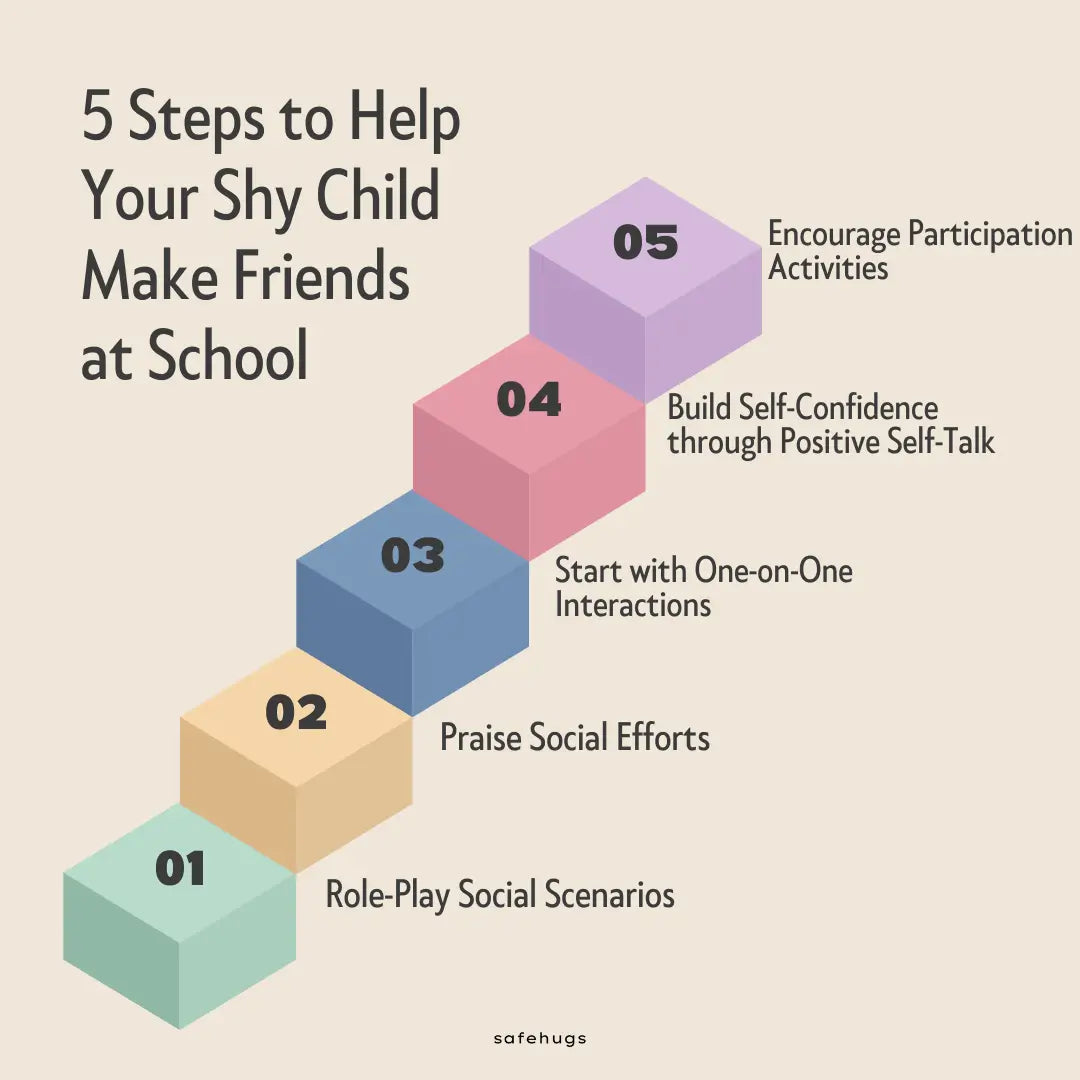Top 20 Activities to Overcome Shyness in Children
Table of Contents
Shyness is common in children and can sometimes limit their social and learning experiences. While natural in new situations, excessive shyness may hinder forming friendships, self-expression, and participation in group activities. With patience, encouragement, and structured activities, parents can help build their child's confidence, self-esteem, and social skills. Every child is unique, so understanding their specific needs is key to supporting their growth.
Understanding Shyness in Children

Shyness often appears as hesitation or discomfort in social situations, marked by avoiding eye contact, clinging to familiar people, or reluctance to speak. It can stem from temperament, past experiences, or fear of judgment. Shyness may be temporary for some children or a consistent trait for others. Understanding its causes—whether natural disposition, limited social exposure, or specific insecurities—is key. Responding with empathy helps children feel supported and confident as they gradually step out of their comfort zone.
Activities to Overcome Shyness
Helping children overcome shyness requires a mix of patience, creativity, and thoughtful activities that gently encourage social engagement. These activities are designed to build confidence and ease the discomfort often associated with social settings. Here are some tried-and-tested best activities for a shy child:

- Role-Playing Scenarios: Role-playing helps children practice social interactions in a safe setting, such as introducing themselves or sharing a toy. Rehearsing responses builds confidence, and positive reinforcement makes the experience rewarding.
- Group Playdates: Small, structured playdates with activities like games or baking help shy children engage with others in a secure environment, fostering collaboration and gradual social involvement.
- Extracurricular Activities: Hobbies like art, music, or sports connect children with peers who share their interests, providing enjoyable ways to step out of their comfort zone and build social confidence.
-
Storytelling and Puppetry: Storytelling and puppetry allow shy children to express themselves creatively and indirectly, helping them explore emotions and gain comfort in social interactions over time.
- Art and Craft Projects: Collaborative projects like murals or puzzles encourage teamwork and communication, allowing shy children to connect with others through shared creative activities.
- Outdoor Adventures: Nature outings such as hikes, park visits, or picnics provide relaxed settings for casual social interactions, helping children engage with others naturally.
- Interactive Games: Games like charades or scavenger hunts foster playful, low-pressure socialization, encouraging conversation and collaboration while breaking down social barriers.
- Reading Aloud in Small Groups: Reading favorite stories to family or small groups builds speaking confidence and provides a structured way to engage socially in a supportive environment.
- Volunteering Opportunities: Participating in volunteer work, such as community clean-ups or helping at shelters, promotes empathy, teamwork, and meaningful social interactions.
- Dance or Movement Classes: Activities like dance or yoga offer non-verbal expression, reduce stress, and help shy children feel a sense of belonging in group settings.
Expert Advice
Shyness is not a flaw; it's a personality trait. The goal isn't to 'fix' shyness but to help children feel confident in social settings. Start with activities they enjoy, and encourage them with small, achievable milestones to boost self-esteem. - Dr. Meera Krishnan
Self-Esteem Activities for Preschoolers
Building self-esteem is a cornerstone of helping shy children gain the confidence they need to engage with the world. Simple, creative activities can empower children, helping them recognize their unique qualities and abilities. Here are more ways to nurture a positive self-image in preschoolers:

- Positive Affirmations: Encourage daily affirmations like “I am brave” to build self-belief. Use mirrors and colorful cards around the house as reminders.
- Achievement Charts: Celebrate milestones with sticker charts, reinforcing positive behaviors. Small treats or extra playtime keep motivation high.
- "All About Me" Projects: Create personal scrapbooks highlighting strengths and interests. Displaying these projects boosts pride and belonging.
- Mirror Time: Spend time with your child in front of a mirror, pointing out positive traits to encourage self-acceptance.
- Kindness Jars: Fill a jar with notes of kind actions or compliments. Review them weekly to reinforce your child's positive qualities.
- Role-Playing Empowering Scenarios: Act out confidence-building situations, like introducing themselves or expressing feelings, to boost comfort and self-assurance.
- Practice Responsibility: Assign small tasks like feeding pets or tidying toys to foster independence and confidence.
- Building Blocks of Confidence: Build a "Confidence Tower" with positive affirmations for each block, celebrating when complete.
- Sharing Stories of Strength: Read stories about characters overcoming challenges, discussing how your child can relate and draw inspiration.
- Celebrate Effort, Not Just Success: Praise persistence and effort, teaching resilience and the value of trying again, regardless of the outcome.
Social Scripts for Making Friends
Social scripts help shy children navigate interactions by providing pre-prepared dialogues. These scripts serve as a guide, making social situations feel more manageable and familiar. Practicing them helps children internalize positive behaviors, build confidence, and strengthen social skills.

Examples of Social Scripts for Making Friends
Greeting a Peer
“Hi, I’m [name]. What’s your favorite game?”
Teaching your child to start conversations with a simple greeting helps them break the ice. It also opens the door for a friendly exchange, making it easier to begin interactions without feeling overwhelmed.
Joining a Group Activity
“Can I play with you? I like [activity] too.”
Joining a group can be intimidating for shy children. This script encourages them to initiate with a positive, inclusive tone. It also reassures them that it’s okay to ask to join in, emphasizing that they are welcome to participate.
Asking for Help
“Can you help me with this? I’m trying to [task].”
This script empowers children to reach out for help when they need it. Asking for assistance not only fosters interaction but also encourages the child to form connections through cooperation.
Giving Compliments
“I like your [shirt/toy/drawing]. It’s really cool!”
Compliments are a great way to connect with others. By teaching your child to give genuine compliments, you help them build rapport with peers and encourage positivity in their interactions.
Expressing Feelings
“I feel sad because [reason]. Can you play with me?”
Learning to express emotions is vital for building empathy and understanding. This script teaches children to communicate their feelings openly, which can create deeper connections with friends.
Making Invitations
“Would you like to come over and play? I have [toy/game].”
Offering invitations is a key way to initiate playdates and build friendships. This script helps children take the first step in reaching out and fostering ongoing connections.
Saying Goodbye
“I had fun playing with you! See you later!”
Saying goodbye can be awkward for children, especially if they feel unsure about the interaction. This simple, cheerful farewell script reinforces positive closure to the interaction, ensuring the child feels confident in leaving the situation.
Dealing with Conflict
“I didn’t like that. Can we talk about it?”
Conflict is a natural part of relationships, and teaching children how to handle it respectfully is essential. This script allows children to express their discomfort without being confrontational, promoting problem-solving and understanding.
Discover Safehugs Parenting Blog, for practical tips, heartfelt advice, and creative ideas to support your parenting journey.
Parental Involvement and Support
Parents play a vital role in helping children overcome shyness. Here are some key tips to support their journey:
- Create a Safe Environment - Ensure your child feels secure, both at home and in new social situations, to encourage them to step out of their comfort zones.
- Gradual Exposure - Introduce social situations gradually, starting with one-on-one playdates or small groups before moving to larger gatherings.
- Foster Independence - Allow your child to make small decisions, like choosing a toy or a playmate, to build confidence and social comfort.
- Be Patient - Understand that overcoming shyness takes time. Celebrate small steps and avoid pushing your child too hard.
- Practice Social Skills - Encourage social skills practice in everyday situations, like greeting others during outings, to normalize social interactions.
Did You Know?
According to a 2023 study by the National Institute of Mental Health and Neurosciences (NIMHANS) in India, nearly 40% of children who exhibit shy behavior respond positively to structured social activities within a supportive environment.
- Positive Reinforcement - Praise your child for their effort, not the result, to motivate them to continue trying in social situations.
- Set Realistic Expectations - Progress may be slow. Celebrate each step, and remember that each child moves at their own pace.
- Teach Empathy - Discuss how others might feel in social situations to help your child relate and feel more comfortable interacting.
- Role Models - Introduce your child to confident role models who can inspire them with positive social behaviors.
- Avoid Comparisons - Don’t compare your child to others. Focus on their unique qualities and progress.
- Positive Social Experiences - Arrange playdates or activities your child enjoys to make socializing fun and less intimidating.
- Be a Safe Haven - Ensure your child knows they have your full support, no matter how their social interactions go.
Shyness is not a flaw but a characteristic that can be nurtured and guided. Through activities that build self-esteem and social confidence, and with the support of caring adults, children can develop the skills they need to thrive.
Encourage your child to take small steps, celebrate their progress, and remember that every child grows at their own pace. With time and patience, your shy child can transform into a confident and socially adept individual.
Related:
- Explore “Helping Your Shy Child Make Friends at School – Tips for Parents”.
- Explore our blog on "Understanding the Signs, Symptoms, and Causes of Shyness".
FAQ'S
1. What activities are good for shy children?
Activities like role-playing, group playdates, storytelling, puppetry, art and craft projects, and extracurricular classes aligned with their interests are great for shy children. These activities help build confidence, encourage social interactions, and provide non-verbal ways of expression.
2. How do I help my child overcome shyness?
To help your child overcome shyness, focus on creating a supportive environment where they feel safe and encouraged to express themselves. Avoid labeling them as shy and instead gently introduce them to new social situations at their own pace. Celebrate their efforts, no matter how small, and model confident behavior for them to emulate.
3. What method can we use to overcome shyness?
Overcoming shyness involves creating opportunities for practice and growth in a non-threatening way. Social scripts and role-playing are effective for building confidence in specific scenarios. Positive reinforcement and gradual exposure to new environments can also help children feel more at ease and capable in social situations.
4. Are shy children introverted?
Not always. While some shy children might be introverted, shyness is a response to unfamiliar situations and doesn’t necessarily reflect their personality type. With support and practice, shy children can learn to navigate social situations confidently.
5. Can shyness go away naturally?
For some children, shyness diminishes as they gain confidence and experience in social settings. However, support from parents, teachers, and structured activities can significantly accelerate this process.
































